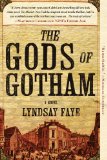Summary | Excerpt | Reading Guide | Reviews | Beyond the Book | Readalikes | Genres & Themes | Author Bio

A Novel
by Lyndsay FayeChapter 1
When I set down the initial report, sitting at my desk at the Tombs, I wrote:
On the night of August 21, 1845, one of the children escaped.
Of all the sordid trials a New York City policeman faces every day, you wouldn't expect the one I loathe most to be paperwork. But it is. I get snakes down my spine just thinking about case files.
Police reports are meant to read "X killed Y by means of Z." But facts without motives, without the story, are just road signs with all the letters worn off. Meaningless as blank tombstones. And I can't bear reducing lives to the lowest of their statistics. Case notes give me the same parched-headed feeling I get after a night of badly made New England rum. There's no room in the dry march of data to tell why people did bestial things - love or loathing, defense or greed. Or God, in this particular case, though I don't suppose God was much pleased by it.
If He was watching. I was watching, and it didn't please me any too keenly.
For instance, look what happens when I try to write an event from my childhood the way I'm required to write police reports:
In October 1826, in the hamlet of Greenwich Village, a fire
broke out in a stable flush adjacent to the home of Timothy
Wilde, his elder brother, Valentine Wilde, and his parents,
Henry and Sarah; though the blaze started small, both of the
adults were killed when the conflagration spread to the main
house by means of a kerosene explosion.
I'm Timothy Wilde, and I'll say right off, that tells you nothing. Nix. I've drawn pictures with charcoal all my life to busy my fingers, loosen the feeling of taut cord wrapped round my chest. A single sheet of butcher paper showing a gutted cottage with its blackened bones sticking out would tell you more than that sentence does.
But I'm getting better used to documenting crimes now that I wear the badge of a star police. And there are so many casualties in our local wars over God. I grant there must have been a time long ago when to call yourself a Catholic meant your bootprint was stamped on Protestant necks, but the passage of hundreds of years and a wide, wide ocean ought to have drowned that grudge between us, if anything could. Instead here I sit, penning a bloodbath. All those children, and not only the children, but grown Irish and Americans and anyone ill-starred enough to be caught in the middle, and I only hope that writing it might go a way toward being a fit memorial. When I've spent enough ink, the sharp scratch of the specifics in my head will dull a little, I'm hoping. I'd assumed that the dry wooden smell of October, the shrewd way the wind twines into my coat sleeves now, would have begun erasing the nightmare of August by this time.
I was wrong. But I've been wrong about worse.
Here's how it began, now that I know the girl in question better and can write as a man instead of a copper star:
On the night of August 21, 1845, one of the children escaped.
The little girl was aged ten, sixty-two pounds, dressed in a delicate white shift with a single row of lace along the wide, finely stitched collar. Her dark auburn curls were pulled into a loose knot at the top of her head. The breeze through the open casement felt hot where her nightdress slipped from one shoulder and her bare feet touched the hardwood. She suddenly wondered if there could be a spyhole in her bedroom wall. None of the boys or girls had ever yet found one, but it was the sort of thing they would do. And that night, every pocket of air seemed breath on flesh, slowing her movements to sluggish, watery starts.
She exited through the window of her room by tying three stolen ladies' stockings together and fixing the end to the lowest catch on the iron shutter. Standing up, she pulled her nightgown away from her body. It was wet through to her skin, and the clinging fabric made her flesh crawl. When she'd stepped blindly out the window clutching the hose, the August air bloated and pulsing, she slid down the makeshift rope before dropping to an empty beer barrel.
Excerpted from The Gods of Gotham by Lyndsay Faye. Copyright © 2012 by Lyndsay Faye. Excerpted by permission of Amy Einhorn Books. All rights reserved. No part of this excerpt may be reproduced or reprinted without permission in writing from the publisher.




To win without risk is to triumph without glory
Click Here to find out who said this, as well as discovering other famous literary quotes!
Your guide toexceptional books
BookBrowse seeks out and recommends the best in contemporary fiction and nonfiction—books that not only engage and entertain but also deepen our understanding of ourselves and the world around us.